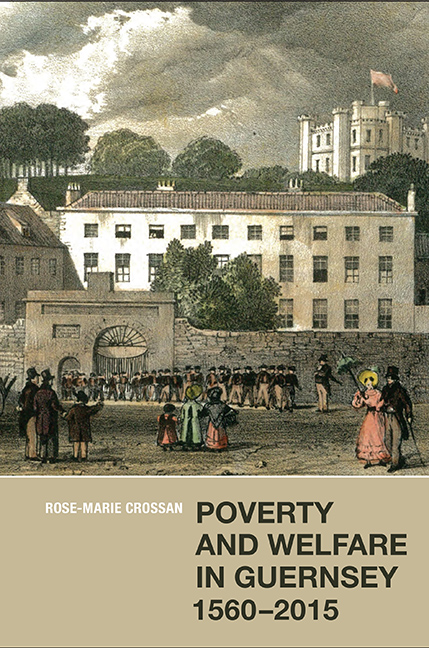Book contents
- Frontmatter
- Dedication
- Contents
- List of Illustrations
- Acknowledgements
- Abbreviations
- Conventions, Note on curren
- Maps
- Introduction
- I Context
- II Welfare
- III Town Hospital
- IV Twentieth Century and Beyond
- Conclusion
- Appendix 1 Writings on Peasant Proprietorship in Guernsey
- Appendix 2 Poor Rates, Indoor and Outdoor Relief Spending, St Peter Port, 1724–1924
- Appendix 3 Parochial Poor Relief in Other Channel Islands
- Appendix 4 Average Year-end Head-counts and Average Annual Admissions and Discharges, Town Hospital, 1700s–1900s
- Appendix 5 Adult Admissions Ascribed to Illness and Accidents, Town Hospital, 1852–1919
- Appendix 6 Relative Proportions of Men and Women in Year-end Head-counts and Annual Admissions, Town Hospital, 1750–1919
- Appendix 7 Annual Averages of Child Admissions and Year-end Numbers, Town Hospital, 1756–1919
- Appendix 8 Over-60s as a Proportion of all Inmates, and Composition by Sex of Over-60s Cohort, Town Hospital, 1756–1911
- Appendix 9 Average Weekly Amounts Purchased per Head, Town Hospital, 1760–1917
- Appendix 10 Timeline: Developments in Poor Relief and Social Security, 1700–2010
- Bibliography
- Index
- Frontmatter
- Dedication
- Contents
- List of Illustrations
- Acknowledgements
- Abbreviations
- Conventions, Note on curren
- Maps
- Introduction
- I Context
- II Welfare
- III Town Hospital
- IV Twentieth Century and Beyond
- Conclusion
- Appendix 1 Writings on Peasant Proprietorship in Guernsey
- Appendix 2 Poor Rates, Indoor and Outdoor Relief Spending, St Peter Port, 1724–1924
- Appendix 3 Parochial Poor Relief in Other Channel Islands
- Appendix 4 Average Year-end Head-counts and Average Annual Admissions and Discharges, Town Hospital, 1700s–1900s
- Appendix 5 Adult Admissions Ascribed to Illness and Accidents, Town Hospital, 1852–1919
- Appendix 6 Relative Proportions of Men and Women in Year-end Head-counts and Annual Admissions, Town Hospital, 1750–1919
- Appendix 7 Annual Averages of Child Admissions and Year-end Numbers, Town Hospital, 1756–1919
- Appendix 8 Over-60s as a Proportion of all Inmates, and Composition by Sex of Over-60s Cohort, Town Hospital, 1756–1911
- Appendix 9 Average Weekly Amounts Purchased per Head, Town Hospital, 1760–1917
- Appendix 10 Timeline: Developments in Poor Relief and Social Security, 1700–2010
- Bibliography
- Index
Summary
Robert Montgomery Martin's remark that Guernsey had ‘no poor laws, and no paupers requiring relief ‘ was not uncharacteristic of early nineteenth-century writing on the island. This claim was originally made by leading islanders wishing to portray their land tenure system in a positive light, and it was subsequently taken up by British authors to make a political point about their own tenurial systems in an era, just before the introduction of new poor laws in England, Wales and Ireland, when the problem of rural poverty was high on the United Kingdom agenda. The assertion is in two parts, and we shall tackle them in reverse order.
There was no great wealth in Guernsey's country parishes, but, in an economy based on peasant agriculture, those who lived most comfortably were those with the largest farms. In 1851, there were about 500 farms of more than ten acres in Guernsey. With a rural population of some 2,500 households, this meant that approximately 80 per cent of families lived on holdings of less than that size. Those who lived on the smaller holdings usually led hand-to-mouth existences, supplementing their own produce with earnings from trade or labour. Even after quarrying and horticulture had increased rural work opportunities in the nineteenth century, life for such families was tough and unpredictable. In earlier centuries, poor harvests and/or high food prices exposed them intermittently to hunger.
St Peter Port, unlike the country parishes, did accommodate an opulent class, particularly between the mid-1700s and mid-1800s. Nevertheless, the well-off were just a small minority and, in overall terms, property ownership in St Peter Port was less widespread than in the country. Owning nothing of their own, most parishioners relied on waged work for a living and paid market prices for shelter and subsistence. This rendered their incomes vulnerable to external economic fluctuations and their budgets vulnerable to high urban rents and food prices. In addition to this, they had also to contend with social problems which rural parishioners were largely spared, since the town bore the brunt of migratory influxes, and paid the price – widows, unwed mothers, orphans and bastards – attached to its role as Guernsey's main port and garrison base.
- Type
- Chapter
- Information
- Poverty and Welfare in Guernsey, 1560-2015 , pp. 269 - 274Publisher: Boydell & BrewerPrint publication year: 2015



